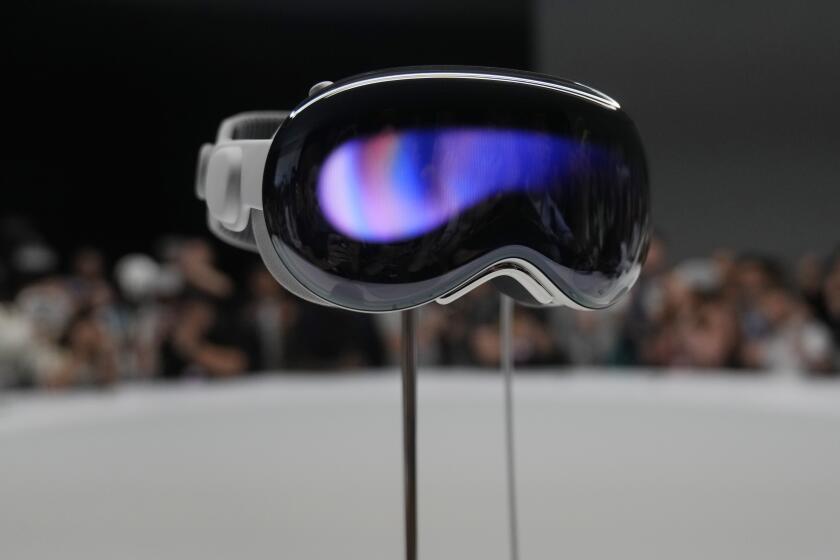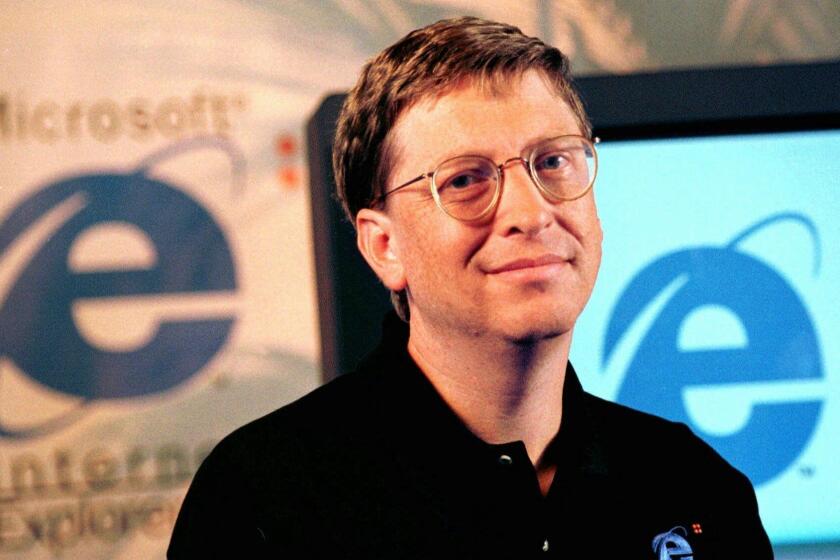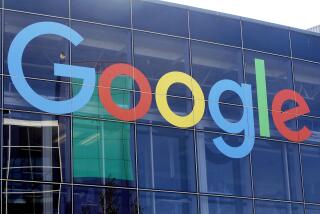What the DOJ’s antitrust suit against Apple means for everyone with an iPhone

- Share via
Cheaper app subscriptions. Additional payment options. Greater freedom for app developers on the App Store. More consumer choice.
Those are some of the possibilities that consumer advocates hope will come to pass for users of Apple iPhones, iPads and other products if the U.S. Department of Justice wins its long-awaited antitrust lawsuit against the Cupertino, Calif., tech giant.
The lawsuit, filed Thursday, accuses Apple of stifling competition and leveraging its clout and ownership of the popular App Store to increase prices for customers. If the DOJ succeeds in its case, the implications for Apple’s business could be significant — potentially changing the ways the company charges app developers and customers for products and services.
“This is a good thing for consumers because the Department of Justice is basically checking Apple’s use of its market power to make sure it’s not an abuse of its market power,” said Jamie Court, president of L.A.-based nonprofit Consumer Watchdog.
The Justice Department’s long-gestating lawsuit takes aim at Apple’s biggest cash cow. California is one of 16 states to join in.
For years, the Apple App Store has taken up to 30% of revenue from app subscriptions or in-app purchases from third-party developers. Developers have said this cut makes it difficult to keep their businesses viable, so they pass that charge on to consumers.
Unlike Google’s Android operating system, which runs on Google phones as well as other devices such as Samsung’s, Apple products operate only through its own software, iOS. The only way that third-party developers can get their app onto Apple’s App Store is by following the iPhone maker’s rules. If they don’t, they risk losing out on millions of customers.
“This is signaling that Apple is going to have to bring its prices for other apps down,” Court said. “It’s going to have to open its payment systems to other providers and it’s going to have to make sure that people who use other devices have basically a comparable access to convenience and service.”
Some businesses, including Swedish audio company Spotify, have directed users to subscribe via their websites, avoiding the up to 30% cut. In 2020, Epic Games sued Apple after it got kicked out of the App Store when its game “Fortnite” was attempting to circumvent Apple’s charge on in-app purchases. A U.S. District Court judge ruled in that case that Apple didn’t maintain a monopoly in the market for mobile games, but ordered the company to allow developers to alert customers to different payment options.
The maker of ‘Fortnite’ may be uniquely positioned to break Apple’s and Google’s mobile app dominance.
Although many analysts expect Apple to change its practices somewhat as a result of the government’s action, they do not expect any major immediate shifts. The most likely outcome is a settlement.
“We do not expect any business model changes for now, but Apple clearly is going to have to find a way to eventually settle this case, pay a hefty fine, and ultimately find some compromise with developers on the App Store structure down the road,” said Daniel Ives, a managing director at Wedbush Securities, in a note to clients.
Apple said in a statement that the Department of Justice lawsuit “threatens who we are and the principles that set Apple products apart in fiercely competitive markets.” Apple has long argued that its business model of creating a tightly controlled ecosystem of software and hardware benefits its customers.
“If successful, it would hinder our ability to create the kind of technology people expect from Apple — where hardware, software, and services intersect,” Apple said. “It would also set a dangerous precedent, empowering government to take a heavy hand in designing people’s technology.”
The company has touted the economic success within the developer community from the App Store. Apple’s App Store ecosystem generated $1.1 trillion in developer billings and sales in 2022, according to Analysis Group. Apple asserted that more than 90% of billings and sales went to developers and businesses without any commission given to Apple.
“As this [Analysis Group] report shows, the App Store is a vibrant, innovative marketplace where opportunity thrives, and we’re as committed as ever to investing in developers’ success and the app economy’s future,” Apple Chief Executive Tim Cook said in a statement in May.
But some analysts say that Apple’s competitors make smaller profits but still provide a level of security and service that protects consumers — and therefore, Apple should be less restrictive. .
“Apple’s margins are much larger than the rest of the industry and that makes them a target for this,” said Rob Enderle, principal analyst with advisory services firm Enderle Group. “When a company has what appears to be excessive margin, it raises the potential of an abuse of monopoly power.”
Apple has unveiled a virtual reality headset that will test the company’s ability to popularize new devices after others failed to capture the public’s imagination.
Critics say that Apple abuses its position as a gatekeeper for the App Store, launching similar Apple products that directly compete against rivals and put them at a disadvantage.
For example, Apple released its own streaming music service, Apple Music, which competes directly with Spotify. Apple foes say that the company has a competitive advantage because it not only owns the iPhone but also controls the software system and App Store. Apple also controls which apps are pre-installed on its iPhones.
“It’s finally bringing to light a lot of the practices that Apple engages in that those within the industry often don’t have the ability to complain about, because they just either are afraid of Apple or don’t have the resources to go up against one of the world’s richest companies,” said Adam Wolfson, a lawyer who represented Mountain View, Calif.-based AliveCor when it sued Apple in 2021 over related concerns.
AliveCor’s lawsuit, which accused Apple of wielding monopoly power through Apple Watch apps, was recently dismissed, but the company said it plans to appeal. Apple said that the judge’s ruling “confirms that it is not anticompetitive” in a statement released to Reuters.
“Apple is not the best at everything and there are numerous examples of apps out there where Apple has had it pushed or made its own version, and it’s not as high quality as what third parties have developed,” said Wolfson, a partner at Quinn Emanuel. “By (Apple) constantly putting itself at the forefront, it’s often making it so that consumers don’t have a choice of the best option.”
Other industry observers say the Department of Justice lawsuit could also bring about more usability across different apps or services on Apple. For example, by making it less awkward when Apple users text with Android customers.
“The green text chains with the one non-Apple friend could be coming to an end,” Ives said.
Of the five biggest tech companies in the U.S., Microsoft is the only one that isn’t currently in the crosshairs of U.S. antitrust authorities.
Many analysts see similarities to the Department of Justice lawsuit and settlement with Microsoft over antitrust practices in 2002, which gave computer manufacturers more freedom in putting other web browsers on their machines not made by Microsoft.
“It set the tone for the whole internet age,” Court said. “If Microsoft had been allowed to dominate that market, we would never have the proliferation of companies that came about with innovative products. If Microsoft could have forced everyone who had a Windows operating system to use their browser, then there’d be no Google.”
Times staff writer Hannah Fry contributed to this report.
More to Read
Inside the business of entertainment
The Wide Shot brings you news, analysis and insights on everything from streaming wars to production — and what it all means for the future.
You may occasionally receive promotional content from the Los Angeles Times.















